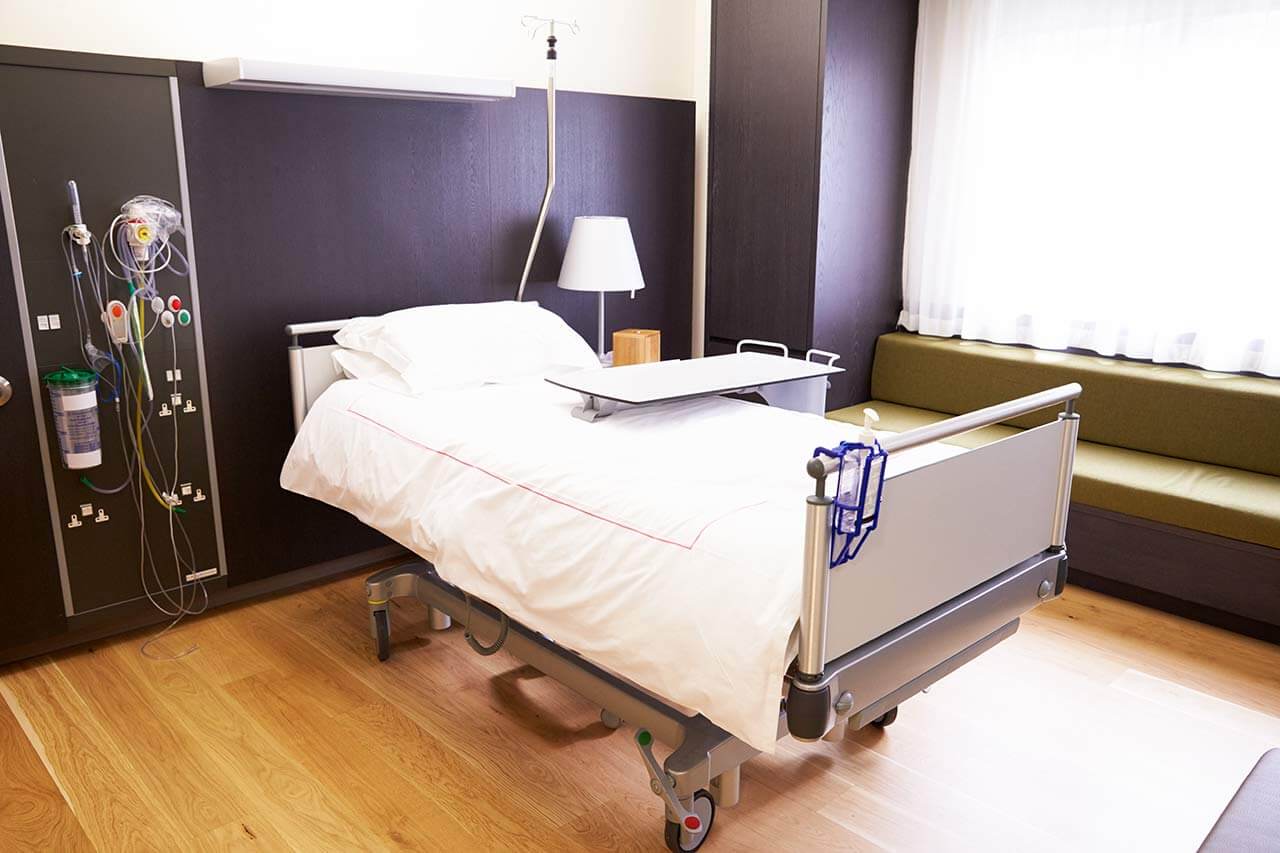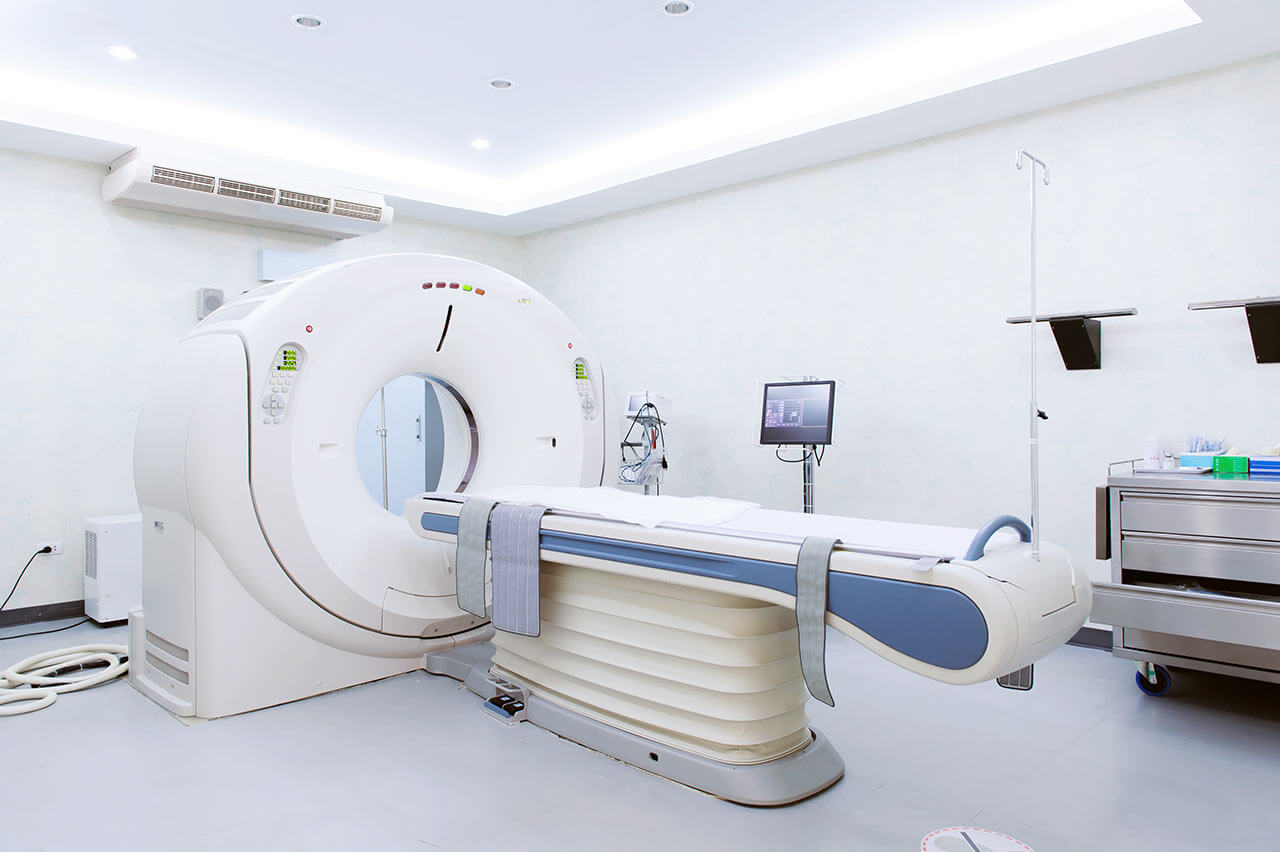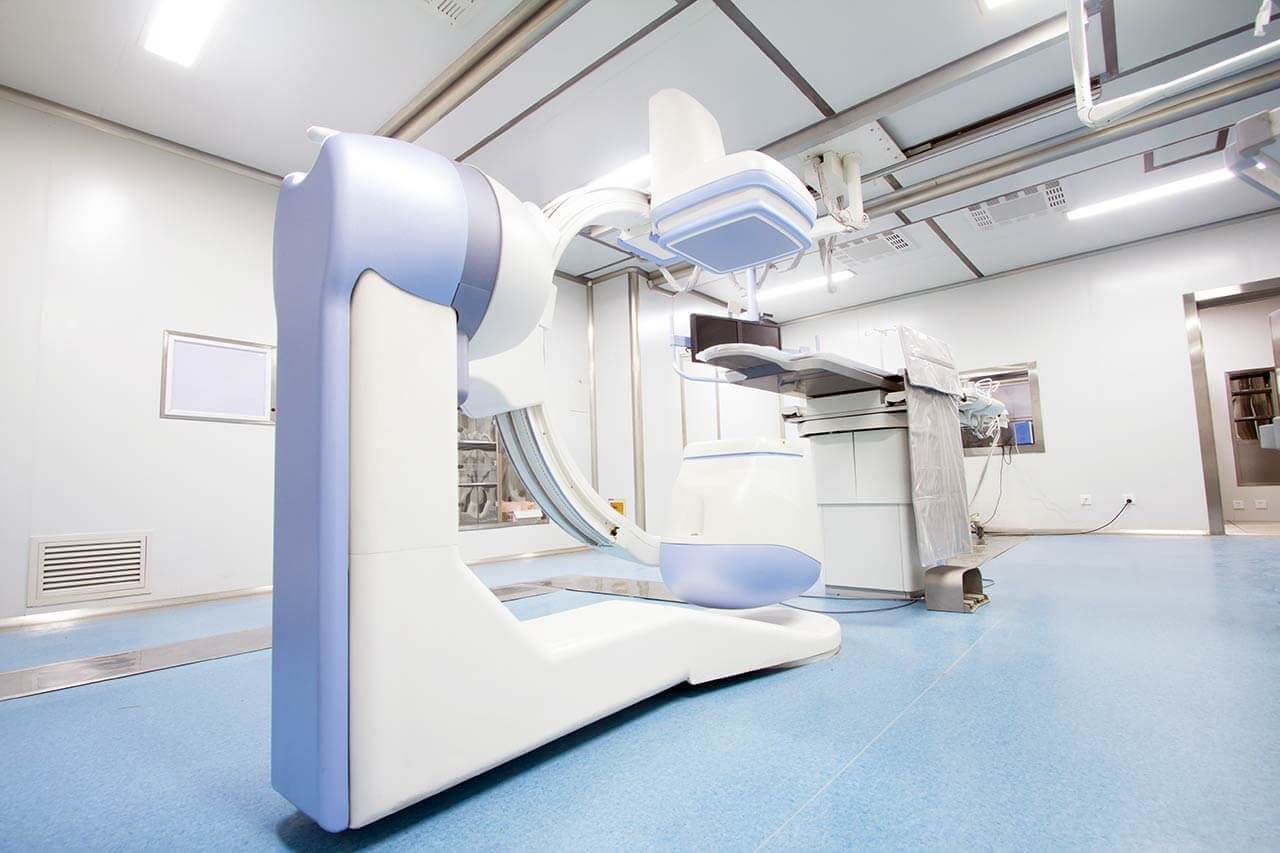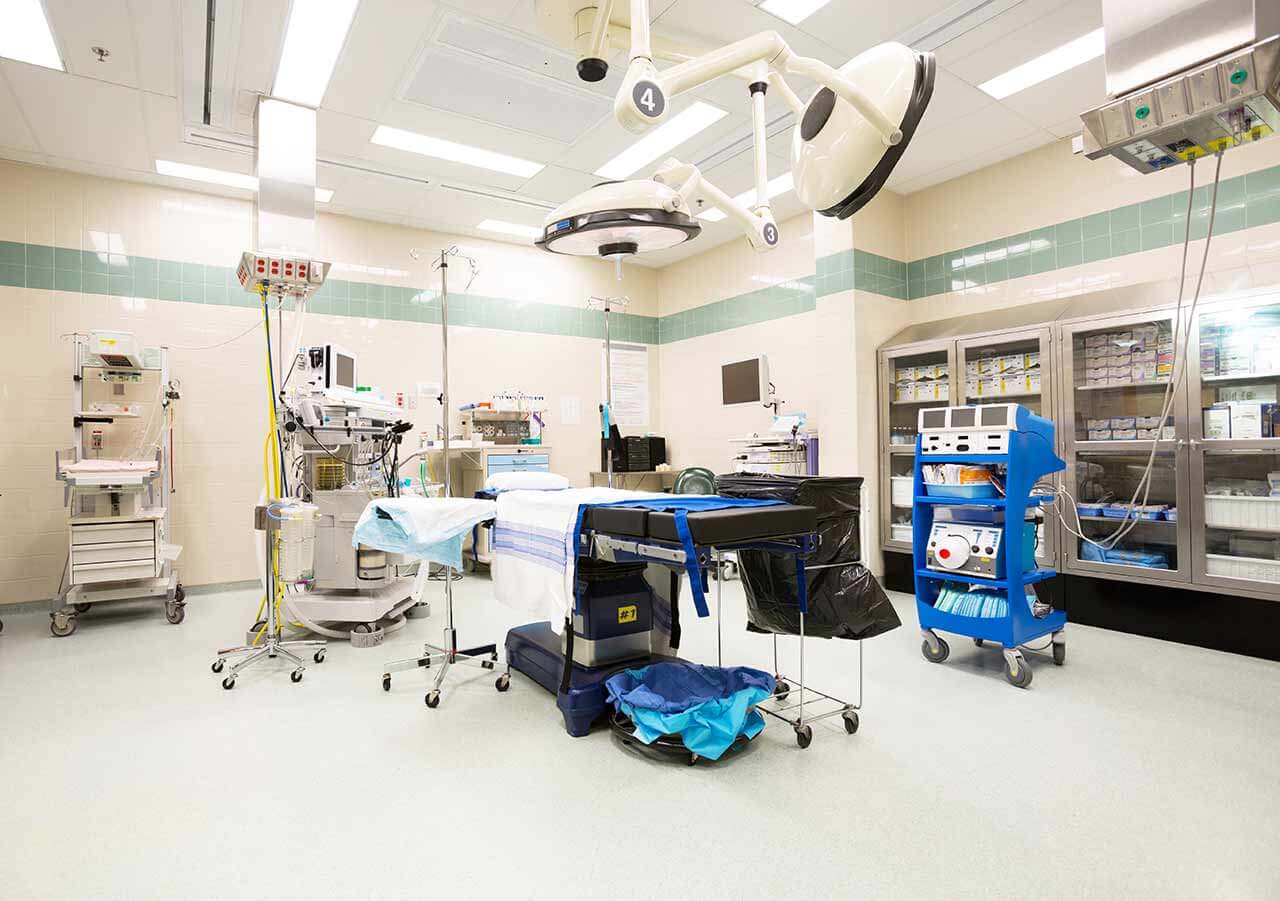
The program includes:
- Initial presentation in the clinic
- clinical history taking
- review of medical records
- physical examination
- laboratory tests:
- complete blood count
- general urine analysis
- biochemical analysis of blood
- TSH-basal, fT3, fT4
- tumor markers
- inflammation indicators (CRP, ESR)
- indicators of blood coagulation
- abdominal ultrasound scan
- CT scan/MRI or PET-CT of abdomen
- preoperative care
- cytoreductive surgery to remove visible tumors
inside the abdomen and HIPEC - histological and immunohistochemical
examination of removed tissues - symptomatic treatment
- cost of essential medicines
- nursing services
- stay in the hospital with a full board
- accommodation in a 2-bedroom ward
- elaboration of further recommendations
How program is carried out
During the first visit, the physician will conduct a clinical examination and go through the results of the available diagnostic tests. After that, you will undergo the necessary additional examination, such as the assessment of liver and kidney function, ultrasound scan and tomography of the abdominal organs. Based on the results of the examination, the physician will choose the surgical technique and the type of anesthesia. After that, preparation according to the preoperative standard will start.
Cytoreductive surgery begins with general anesthesia. The intervention is performed as open surgery, i.e. through the incision in the anterior abdominal wall, so that the surgeon can carefully examine the peritoneum and the surface of the abdominal organs. The surgeon removes affected by the malignant process areas of the stomach and peritoneum, metastases in other internal organs. This stage of the operation can take several hours, since the overall effectiveness of the treatment depends on the completeness of the malignant tissues removal.
At the next stage of the operation, the surgeon inserts several catheters into the abdominal cavity. Through the catheters, a heated solution of a chemotherapy drug is pumped inside. The special system maintains the required temperature (42-43 degrees Celsius), pressure and circulation rate of the medicinal solution. The solution mechanically flushes out blood clots and remnants of malignant tissues, and a heated chemotherapy drug destroys micrometastases in internal organs and lymph nodes (micrometastases can’t be detected by the naked eye).
After 1-1.5 hours, the chemotherapy drug is removed from the abdominal cavity and the abdominal cavity is washed with saline. After that, the surgeon removes the catheters and sutures the incision of the anterior abdominal wall.
After the completion of the operation, you will be transferred to the ward of the intensive care unit, under the round-the-clock supervision of doctors and nurses. In 1-3 days after the operation, your drains will be removed and you will be transferred to a regular ward for further recovery. The whole treatment takes 10-12 days on average.
Finally, the attending physician will evaluate the results of control examinations, schedule the date of discharge from the hospital and give you detailed recommendations for further follow-up and treatment.
Service
You may also book:
 BookingHealth Price from:
BookingHealth Price from:
About the department
According to the Focus magazine, the Department of General, Abdominal and Vascular Surgery at the Charite University Hospital Berlin ranks among the top German medical facilities specializing in the treatment of bowel and lung cancer!
The department offers all the modern surgical options for the treatment of diseases of the abdominal cavity and blood vessels. The department's doctors have expert knowledge and vast experience in the treatment of colorectal cancer, stomach, esophageal, pancreatic cancers, liver metastases, inflammatory bowel diseases (diverticular disease, Crohn's disease, ulcerative colitis). Also, they specialize in the surgical treatment of vascular pathologies and thyroid diseases. The department is headed by PD Dr. med. Katharina Beyer.
The department's medical team provides first-class medical care using the very latest scientific achievements and demonstrates understanding of the needs and wishes of each patient. The excellent technical equipment plays a significant role in the successful clinical practice of a medical institution as well. The department offers modern operating rooms with high-precision computer equipment, monitoring systems, devices for robot-assisted surgery, etc. In addition, the department has a hybrid operating room.
The department's surgeons widely practice both classical surgical interventions and modern surical procedures, including minimally invasive surgery ("keyhole surgery") and robot-assisted surgeries (surgery using the da Vinci Surgical System). In the field of vascular surgery, the doctors also offer endovascular interventions. Due attention is paid to interdisciplinary cooperation, for example, with the Departments of Gastroenterology and Oncology. Thanks to cutting-edge equipment for endoscopic and radiological examinations, the department's specialists can make the most accurate diagnosis, determine the stage of the pathology and its localization, and also accurately plan the surgical treatment.
The main clinical focuses of the department include:
- Surgical oncology
- Bowel cancer
- Liver metastases
- Surgical techniques (for example, partial liver resection)
- Minimally invasive ablation techniques (for example, radiofrequency ablation, microwave ablation)
- Esophageal carcinoma
- Stomach cancer
- Recurrent rectal cancer
- Pancreatic cancer
- Thyroid cancer
- Surgical treatment of chronic inflammatory bowel diseases
- Crohn's disease
- Ulcerative colitis
- Abdominal surgery
- Sigmoid diverticulitis
- Gastroesophageal reflux disease
- Cholelithiasis
- Inguinal hernia
- Incisional hernia
- Coloproctological diseases (minimally invasive surgery, robotic interventions)
- Fecal incontinence
- Defecation disorders
- Hemorrhoids
- Rectal prolapse
- Anal fissures, fistulas, abscesses
- Anal, rectal tumors
- Vascular surgery
- Aortic aneurysm repair
- Minimally invasive removal of aortic aneurysm
- Open surgeries
- Treatment of peripheral arterial occlusive disease of the lower extremities
- Conservative treatment (drug therapy)
- Minimally invasive treatment techniques (for example, percutaneous transluminal angioplasty, stent implantation)
- Open surgery (in advanced stages of the disease)
- Treatment of carotid stenosis
- Treatment of thrombosis and postthrombotic syndrome
- Thrombolysis
- Thrombectomy
- Dialysis access formation in patients with kidney failure
- Treatment of varicose veins
- Thermal ablation
- Mechanical and chemical endovenous ablation
- Open surgical interventions
- Aortic aneurysm repair
- Other diseases and treatment methods
Curriculum vitae
Clinical Interests
- Treatment of esophageal cancer.
- Treatment of stomach cancer.
- Treatment of gastroesophageal reflux disease.
Research Interests
- Research projects on sepsis.
- Research projects in oncopathologies.
Memberships in Professional Societies
- German Society of Surgery (DGCH).
- German Society for General and Visceral Surgery (DGAV).
- Working Group on Minimally Invasive Surgery.
Photo of the doctor: (c) Charité – Universitätsmedizin Berlin
About hospital
According to the authoritative Focus magazine, the Charite University Hospital Berlin occupies the first place in the rating of the top German medical facilities!
The hospital in Germany provides modern diagnostics and treatment of patients, as well as the training of practicing physicians and scientists. More than half of all German Nobel Prize winners in the field of medicine and physiology, such as Emil von Behring, Robert Koch and Paul Ehrlich, trained and worked in the hospital. The structure of the medical complex includes over 100 specialized departments and institutes, which allows the doctors to guarantee their patients' services in all the existing medical fields. The hospital in Germany has outstanding experience in treating particularly complex clinical cases.
The hospital annually diagnoses and treats more than 152,693 inpatients and about 692,920 outpatients. It also has a huge medical team consisting of 4,225 scientists and doctors and and more than 4,500 nursing staff members who provide top-class medical treatment in Germany. The key task for all specialists of the medical facility is restoring the patient's health or preserving in critical cases. At the same time, the hospital offers a friendly atmosphere, and each patient feels care, respect and sympathy.
The excellent technical medical equipment, highly skilled personnel, availability of innovative diagnostic and treatment techniques, and high ethical standards form a solid foundation for successful clinical and scientific activities. Thus, the hospital is a leading provider of high-quality treatment in Germany.
Photo: (с) depositphotos
Accommodation in hospital
Patients rooms
The patients of the Charite University Hospital Berlin live in comfortable rooms made of modern design. Each room is equipped with an ensuite bathroom with a toilet and a shower. The standard room furnishing includes an automatically adjustable bed, a bedside table, a wardrobe for storing clothes, a table and chairs for receiving visitors, and a TV. If desired, Wi-Fi access can be provided. The hospital also offers enhanced-comfort rooms.
Meals and Menus
The patient and his accompanying person have a daily choice of three menus. If for any reason, you do not like the food, you will be offered an individual menu. Please inform the medical staff about your dietary preferences before the treatment.
Further details
Standard rooms include:
Religion
Religious services are available upon request.
Accompanying person
During the inpatient program, an accompanying person may stay with you in a patient room or at the hotel of your choice.
Hotel
During the outpatient program, you can live at a hotel of your choice. Managers will help you to choose the most suitable options.
The hospital offers a full range of laboratory tests (general, hormonal, tests for infections, antibodies, tumor markers, etc.), genetic tests, various modifications of ultrasound scans, CT scans, MRI and PET / CT, angiography, myelography, biopsy and other examinations. Treatment with medications, endoscopic and robotic operations, stereotaxic interventions is carried out here, modern types of radiation therapy are also used. The hospital offers patients all the necessary therapeutic techniques.
- Proton therapy
- CyberKnife treatment
- Hyperthermic intraperitoneal chemotherapy (HIPEC)
- PSMA therapy with Lutetium-177
- Joint replacement in adults and children
These are oncological diseases, benign neoplasms of the brain and spinal cord, heart valve defects, diabetes mellitus and its complications, joint diseases and other pathologies.
- Neurosurgery
- Oncology
- Plastic and reconstructive surgery
- Interventional radiology
- Proton therapy (Proton Therapy Center BerlinProtonen)
The medical team includes more than 4,225 highly qualified scientists and doctors.





